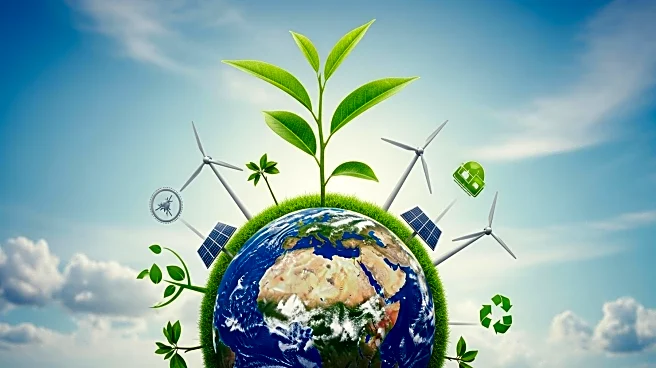What's Happening?
The Second Africa Climate Summit in Addis Ababa, Ethiopia, saw African leaders unveil a $150 billion green plan aimed at positioning the continent as a leader in climate action. The summit emphasized Africa's potential to provide climate solutions despite its low contribution to global greenhouse gas emissions. Key initiatives discussed included Ethiopia's Green Legacy Initiative, which has planted over 48 billion trees since 2019, and Ghana's REDD+ program, supported by the World Bank to combat deforestation. The summit also launched the Africa Climate Innovation Compact (ACIC) and the African Climate Facility (ACF), aiming to raise $50 billion for climate projects. Additionally, African financial institutions committed to mobilizing over $100 billion under the Africa Green Industrialization Initiative (AGII).
Why It's Important?
Africa's new green plan represents a significant shift in global climate politics, highlighting the continent's proactive stance in addressing climate change. By mobilizing substantial financial resources, Africa aims to transform its economies through renewable energy, electric mobility, and sustainable agriculture, potentially creating green jobs and attracting investment. This initiative underscores Africa's role as a key player in global climate solutions, challenging the narrative of the continent as merely a victim of climate change. The commitments made at the summit could lead to increased international collaboration and support, enhancing Africa's capacity to implement effective climate strategies.
What's Next?
Following the summit, African leaders are expected to continue advocating for their climate agenda at the upcoming COP30 climate talks in Brazil. Ethiopia's Prime Minister Abiy Ahmed announced plans to bid for hosting COP32 in 2027, further solidifying Africa's leadership role in global climate discussions. The financial commitments and initiatives launched at the summit will likely lead to increased investment in renewable energy projects across the continent, with a goal of building 300 gigawatts of renewable energy by 2030. The focus will be on implementing the Just Resilience Framework and the Climate Justice Impact Fund to support local community projects.
Beyond the Headlines
The summit's outcomes may influence global perceptions of Africa's capabilities in climate action, potentially altering international policy and investment strategies. The emphasis on climate justice and resilience highlights ethical considerations in addressing climate change, advocating for equitable solutions that benefit vulnerable communities. Long-term, Africa's green plan could drive cultural shifts towards sustainable practices and innovation, positioning the continent as a hub for climate technology and solutions.










